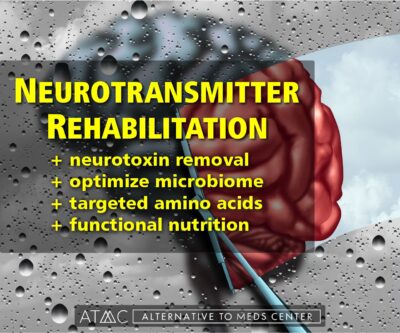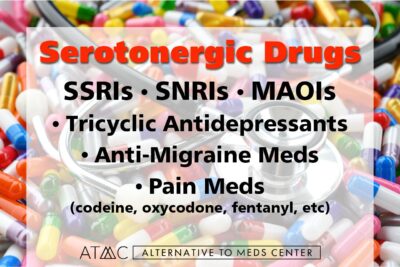What Are the Risks of Long-Term Antidepressant Use?
Long-term antidepressant use may eventually lead to a serious dependence upon the drug — so serious that one cannot function without the drug. But when one attempts to discontinue antidepressants, rebound symptoms are typically more intense than pre-medication symptoms, and this risk may increase with the length of time one has used a medication. Gradual antidepressant tapering is the safest way to avoid this phenomenon.
Cymbalta is a time-release antidepressant, classed as an SNRI, or SSNRI. This means the drug targets 2 main neurotransmitters: serotonin and norepinephrine. Serotonin is an inhibitory neurotransmitter, in effect buffering reactions to stimuli. Norepinephrine is a neuromodulator, which boosts the speed of reaction to outside stimuli. Though there is much left to be discovered about norepinephrine, studies show It regulates and moderates things like attention span, inflammation, the “fight-or-flight response to stress, sleep, and many others. In fact, norepinephrine affects all the other cells in the brain. Both serotonin and norepinephrine are incompletely understood, but what is known is that these neurotransmitters affect virtually EVERY function and cell in the body in some way. So this means that long term effects of taking drugs that interfere with these natural hormones can also be expected to affect virtually every function and area of the entire body.16-18
One signal for Cymbalta addiction or dependence is that withdrawal symptoms will begin after a person forgets to take a dose or tries to stop using Cymbalta completely. Though antidepressants are not likely to be abused recreationally, many long-term users develop an antidepressant tolerance. Tolerance means that the initially prescribed dosage is no longer producing the same effects.3 Tolerance is indicated when the person begins to increase the dosage or frequency of dosing to achieve the same level of effects. To overcome Cymbalta addiction safely, and without relapse, a thorough, comprehensive treatment program is typically required.
Outcomes of Long-Term Antidepressant Use are Under-Studied
The outcomes for long-term antidepressant use for SSRIs and SNRIs are relatively under-studied, according to authors Danborg, Valdersdorf, and Gotzsche. After reviewing over 9000 medical records on the subject, the authors concluded that there were too few trials of long-term harms or safety concerns to establish or investigate the harms of long-term use. The authors noted that the vast majority of the trials (all but 2) reported more than a 20% drop-out rate, due to adverse effects or lack of efficacy, and concluded that these drugs were not beneficial for long-term use and that their benefits have been exaggerated. Their findings were published in the 2019 International Journal of Risk and Safety in Medicine.7
Cornett et al report in the Ochsner Journal of 2017 that long-term antidepressant use results in sustained blocked neurotransmission and cites tardive dyskinesia (TD) and other movement disorders that can arise as a result of long-term antidepressant use. The authors note that tardive dyskinesia may emerge while taking antidepressants, or after abrupt discontinuation. TD may also emerge up to a year after antidepressant discontinuation. This indicates further evidence that slow and gradual withdrawal, giving the body and CNS time to recalibrate as the dosage is lowered, over an adequate time frame is the safest way to come off antidepressants.8
Does Cymbalta Addiction Respond to Addiction Treatment?
When a heroin addict develops tolerance they will increase their dosage to produce the same effects as before. When Cymbalta begins to “not work as well,” that indicates that medication tolerance is occurring. It is very similar to the above scenario with the heroin user, except it is the doctor who increases the dosage for you.
 Drugs are addictive because of their mechanism, not because they were bought on the street. Many classifications of medications can cause addiction and the mechanics are surprisingly similar. Cymbalta addiction may seem less likely, possibly because antidepressants are not typically used recreationally. Antidepressant dependence or addiction is a real and actual phenomenon with clearly recognizable characteristics. Using antidepressants to cover up depression doesn’t remove any actual real-life problems — the problems are still there and the drug will not make them disappear. That is where a recovery program can be helpful. Cymbalta addiction or dependence responds to help such as counseling and nutritional neurotransmitter rehabilitation as well as slow tapering. These actions are needed to overcome the many factors that are keeping drug dependence in place.
Drugs are addictive because of their mechanism, not because they were bought on the street. Many classifications of medications can cause addiction and the mechanics are surprisingly similar. Cymbalta addiction may seem less likely, possibly because antidepressants are not typically used recreationally. Antidepressant dependence or addiction is a real and actual phenomenon with clearly recognizable characteristics. Using antidepressants to cover up depression doesn’t remove any actual real-life problems — the problems are still there and the drug will not make them disappear. That is where a recovery program can be helpful. Cymbalta addiction or dependence responds to help such as counseling and nutritional neurotransmitter rehabilitation as well as slow tapering. These actions are needed to overcome the many factors that are keeping drug dependence in place.
Neurotoxin removal is another vital step in restoring full health and many studies show that modern life exposes us daily to toxins that can impact our mental health.
Nutritional supports can be life-changing, such as magnesium, omega-three fatty acids, and other important raw materials for the restoration of natural brain health.14,15 Addressing the many layers of depression, anxiety, or other health conditions in natural and healthy ways, effectively supports recovery from Cymbalta addiction in the long term.
A thorough program to address Cymbalta addiction or dependence at Alternative to Meds Center utilizes nutritional therapies, Equine therapy, counseling, neurotoxin cleansing, safe and gradual Cymbalta tapering, IV treatments, and many, many other therapeutic aids to recovery.4-6
Why Are Antidepressants Prescribed So Often?
Cymbalta is approved to treat a wide array of conditions, including pain, anxiety, depression, and fibromyalgia. It is also prescribed off-label for everything from irritable bowel syndrome to urinary incontinence to lower back pain.2
The trouble is that people are most often given an antidepressant without any other investigative effort to find out why the person is suffering from these conditions. Factors such as vitamin or mineral deficiencies, food allergies, toxic exposures, lack of fulfilling lifestyle or life plan, neurotoxicity after toxic exposure, and many other possible contributing factors to depression are not checked for routinely. It is extremely common for a person to have such a poor diet lacking in nutrients that they are unable to produce what is required for a healthy brain. Our brain is subjected to the same harms of a poor diet that our bodies are subjected to.
 Another reason Cymbalta has seen an increase in prescriptions is the rising trend in diagnoses of depression and anxiety, and other conditions associated with a near frenzy of medication for treatment. Of great concern, all antidepressants including Cymbalta carry a black box warning for increased risk of suicide for children and adolescents.1 However, later research has shown that certain persons with agitation, anxious states, or a history of depression, both adolescents and adults, will be more likely to become suicidal when taking antidepressants.9
Another reason Cymbalta has seen an increase in prescriptions is the rising trend in diagnoses of depression and anxiety, and other conditions associated with a near frenzy of medication for treatment. Of great concern, all antidepressants including Cymbalta carry a black box warning for increased risk of suicide for children and adolescents.1 However, later research has shown that certain persons with agitation, anxious states, or a history of depression, both adolescents and adults, will be more likely to become suicidal when taking antidepressants.9
Handling the Root Causes of Depression and Other Symptoms
Alternative to Meds Center uncovers the medical causes of why an individual may be depressed, feeling anxious, or unable to sleep. We use lab testing to identify underlying contributing factors to depression. Our program also consists of using natural substances to create stable neurochemistry, elimination of neurotoxins, exacting medication withdrawal techniques, amino therapies, and other nutritional therapies, peer support, personal exercise training, massage, yoga, and other healing holistic therapies that combat depression and create effective Cymbalta addiction treatment plans.
Cymbalta might be prescribed after a traumatic emotional event. But years later they are still on the drug, and still suffering. And maybe things have even gotten worse overall. This is most likely because the root causes were never thoroughly investigated and addressed.
We specialize in seeking out what the root causes were for mental health symptoms. Please review our services overview for treatments delivered at Alternative to Meds Center for Cymbalta addiction treatment.
Find Out More About Cymbalta Addiction Holistic Treatment
We are discovering success every day at Alternative to Meds Center. Each week, we celebrate the positive changes and successes of our participants at our graduation events. Around 50 individuals typically attend, including family members and friends. Meaningful and inspirational tales are talked about at our events, many times recounting several years of bizarre suffering, with clarity that is truly extraordinary. This is an inspiration for us to see this because we know they have the tools now to continue living a healthy life and act as a beacon to other people. You are invited to call, talk with us, and find out the type of Cymbalta addiction help that is available to you or a loved one at our inpatient facility.

 As in all antidepressant medications, tolerance develops over long-term use of Cymbalta, leaving a person suffering from the return of symptoms. According to Fava et al., some experience worsening of original symptoms, along with additional withdrawal effects that are frequently experienced after stopping Cymbalta.12,13
As in all antidepressant medications, tolerance develops over long-term use of Cymbalta, leaving a person suffering from the return of symptoms. According to Fava et al., some experience worsening of original symptoms, along with additional withdrawal effects that are frequently experienced after stopping Cymbalta.12,13 Drugs are addictive because of their mechanism, not because they were bought on the street. Many classifications of medications can cause addiction and the mechanics are surprisingly similar. Cymbalta addiction may seem less likely, possibly because antidepressants are not typically used recreationally. Antidepressant dependence or addiction is a real and actual phenomenon with clearly recognizable characteristics. Using antidepressants to cover up depression doesn’t remove any actual real-life problems — the problems are still there and the drug will not make them disappear. That is where a recovery program can be helpful. Cymbalta addiction or dependence responds to help such as
Drugs are addictive because of their mechanism, not because they were bought on the street. Many classifications of medications can cause addiction and the mechanics are surprisingly similar. Cymbalta addiction may seem less likely, possibly because antidepressants are not typically used recreationally. Antidepressant dependence or addiction is a real and actual phenomenon with clearly recognizable characteristics. Using antidepressants to cover up depression doesn’t remove any actual real-life problems — the problems are still there and the drug will not make them disappear. That is where a recovery program can be helpful. Cymbalta addiction or dependence responds to help such as  Another reason Cymbalta has seen an increase in prescriptions is the rising trend in diagnoses of depression and anxiety, and other conditions associated with a near frenzy of medication for treatment. Of great concern, all antidepressants including Cymbalta carry a black box warning for increased risk of suicide for children and adolescents.1 However, later research has shown that certain persons with agitation, anxious states, or a history of depression, both adolescents and adults, will be more likely to become suicidal when taking antidepressants.9
Another reason Cymbalta has seen an increase in prescriptions is the rising trend in diagnoses of depression and anxiety, and other conditions associated with a near frenzy of medication for treatment. Of great concern, all antidepressants including Cymbalta carry a black box warning for increased risk of suicide for children and adolescents.1 However, later research has shown that certain persons with agitation, anxious states, or a history of depression, both adolescents and adults, will be more likely to become suicidal when taking antidepressants.9







